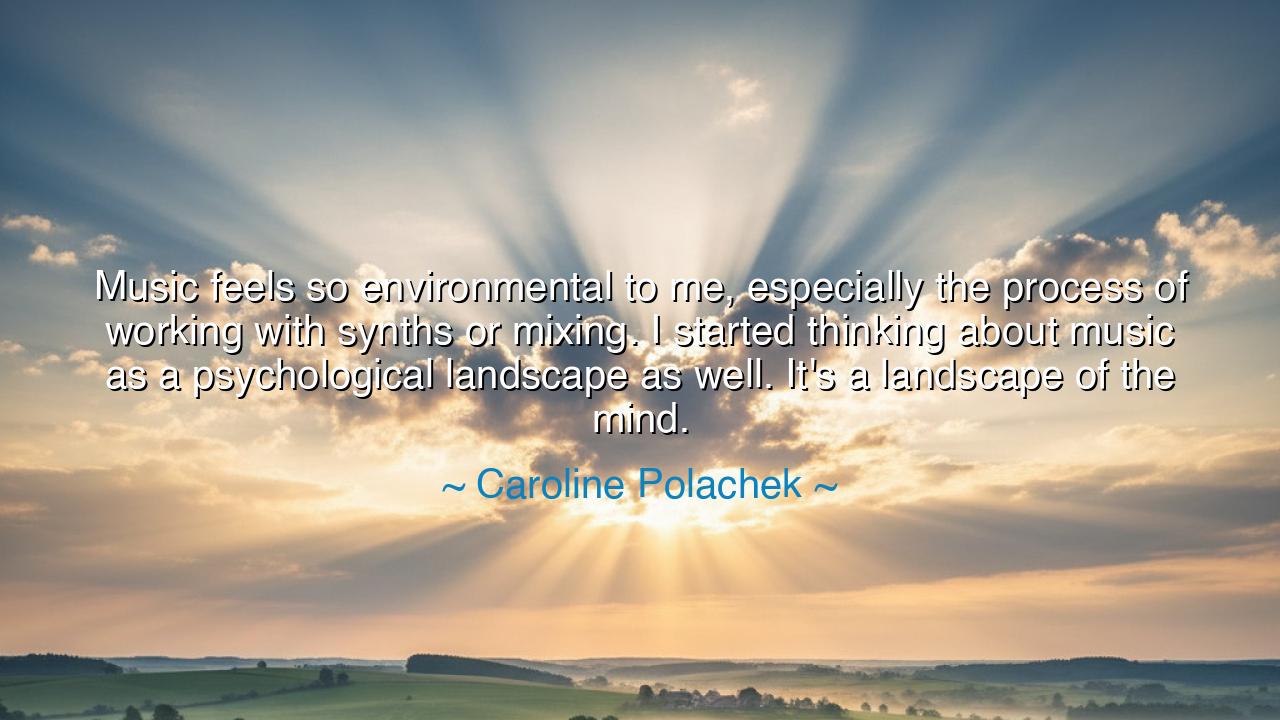
Music feels so environmental to me, especially the process of
Music feels so environmental to me, especially the process of working with synths or mixing. I started thinking about music as a psychological landscape as well. It's a landscape of the mind.






The words of Caroline Polachek—“Music feels so environmental to me, especially the process of working with synths or mixing. I started thinking about music as a psychological landscape as well. It's a landscape of the mind.”—speak like the song of a modern oracle. In them lies a revelation that transcends mere art: the understanding that music is not only sound, but space—a realm we inhabit as deeply as we inhabit forests, cities, or dreams. She reminds us that the artist is not merely a performer but a cartographer of emotion, shaping invisible terrain from the raw material of feeling and thought. To Polachek, music is not confined to the ear—it surrounds, envelops, and transforms, like air turned to melody.
Since the dawn of civilization, music has been the breath of the human spirit. The ancients understood what Polachek expresses in modern form: that sound is the bridge between the seen and the unseen. The chants of monks in echoing cathedrals, the hum of the sitar beneath India’s stars, the pipes of shepherds in the highlands—all were expressions of the same truth: that when sound is shaped with intention, it creates environments of the soul. Music does not merely accompany life; it constructs it. It becomes the landscape within which our thoughts wander, our memories sleep, and our dreams awaken.
When Polachek speaks of synths and mixing, she points to the modern evolution of this ancient craft—the new instruments of creation that allow the musician to sculpt not just melody, but atmosphere. The synthesizer, born from electricity and imagination, mirrors the very mind of its creator. Each tone, each texture, each layer of sound is like light falling across a landscape—shaping mountains of feeling, valleys of thought, and rivers of emotion. The psychological landscape she describes is not a metaphor, but a living place. It is where memory becomes harmony, and emotion takes form as sound.
Consider the example of Brian Eno, a visionary who transformed ambient music into an art of perception. He once said that his goal was to create music that could be “as ignorable as it is interesting”—not because it was dull, but because it was alive, like a forest or a tide. In his work, as in Polachek’s, sound became environmental, something one could live inside rather than merely listen to. This understanding changed not only music, but the very way people conceived of art: no longer as performance, but as presence, a space where consciousness itself could breathe.
Polachek’s insight also carries a deeper truth about the mind. Just as an artist arranges layers of sound to create harmony, so too must each of us arrange the layers of our thoughts, emotions, and desires. The mind is a vast landscape—part wilderness, part garden—and we are both its wanderers and its gardeners. Music, in its purest sense, is a reflection of this internal terrain. When it is chaotic, we feel our own storms; when it is serene, we glimpse our own stillness. Thus, to create or to listen deeply is to explore the geography of the self.
The lesson is not only for musicians, but for all who live in this age of noise. Every day, we craft our psychological soundscape—through the words we speak, the thoughts we feed, the silences we break. If our minds are crowded with dissonance, we must learn, like the careful composer, to mix our inner tracks anew—to balance tone with patience, volume with humility, rhythm with purpose. In doing so, we transform the noise of living into the music of being.
Polachek’s vision is both modern and eternal: that creation is not a product but an atmosphere; that art is not separate from life but interwoven with it. When she calls music “environmental,” she reminds us that beauty is something we dwell within. To build sound is to build emotion, and to listen is to learn how to live. Like a temple built of vibration, her words invite us to treat every note, every thought, every heartbeat as part of a vast, invisible architecture of meaning.
So let us remember: the world outside and the world within are not two, but one. The landscape of the mind is shaped by the music we allow to play through it. Let our thoughts become melodies of gratitude, our actions the rhythm of compassion, and our silence the deep bass of understanding. For in that harmony, we will find not only art—but peace.






AAdministratorAdministrator
Welcome, honored guests. Please leave a comment, we will respond soon